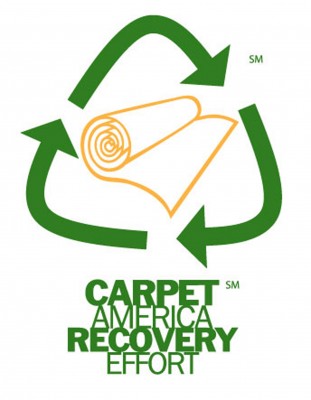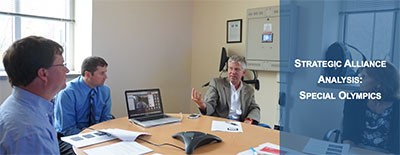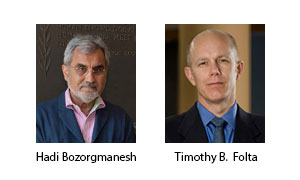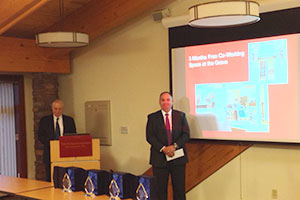CNBC – For a variety of reasons, the solution to joblessness among veterans may be to prod more of them toward entrepreneurship. “This gap is a nut that’s hard to crack, but I actually truly believe that veteran-owned businesses are going to be the thing that heals our country in the next 15 years,” said Michael Zacchea, a retired Marine lieutenant colonel and director of the University of Connecticut’s Entrepreneurial Bootcamp for Veterans with Disabilities.
Experiential Learning Accelerators
UConn School of Business Among Military Times’ Best for Veterans
 The UConn School of Business is among the “Best for Veterans—Business Schools 2015” according to a report released Monday by Military Times.
The UConn School of Business is among the “Best for Veterans—Business Schools 2015” according to a report released Monday by Military Times.
UConn ranked No. 54 nationally, in a year that saw record applications and a process that was highly competitive. It is one of many recognitions that the University has received for its veteran programs, which include an Entrepreneurship Bootcamp for Veterans with Disabilities (EBV). Last year, the UConn EBV and School of Business were recognized by Newman’s Own Foundation as one of the five best veteran non-profit organizations in the country.
DSDA Helps Diverse Business Accelerate Growth with Travelers as Funding Sponsor
Digital Journal – The Diverse Supplier Development Academy (DSDA), a Connecticut non-profit organization that works to develop opportunities for diverse Connecticut-based suppliers, is honored to announce the addition of The Travelers Companies, Inc. as a funding sponsor.
The DSDA was launched in 2013 with the active participation of Northeast Utilities, the UConn School of Business Financial Accelerator and input from several diverse businesses during pilots in 2011.
UConn Receives $435,000 Grant to Create Particle Board with Recycled Carpeting; School of Business’ MBA Students Will Perform Marketing Viability Study
 The University of Connecticut’s School of Engineering and the Institute of Materials Science have received a $435,000 research grant to develop products made from particle board containing recycled carpeting. Approximately $100,000 will be apportioned to the UConn School of Business to perform an economic and market analysis for these new products, which are targeted to the construction industry.
The University of Connecticut’s School of Engineering and the Institute of Materials Science have received a $435,000 research grant to develop products made from particle board containing recycled carpeting. Approximately $100,000 will be apportioned to the UConn School of Business to perform an economic and market analysis for these new products, which are targeted to the construction industry.
Richard Parness, Ph.D., a UConn faculty member in the Polymer Program of Institute of Material Sciences will develop and test the products, in conjunction with colleagues Ioulia Valla and George Bollas. Parness has tremendous expertise in this field, having patented other particle board while at UConn.
The grant is sponsored by the Carpet America Recovery Effort (CARE), whose purpose is to develop market-based solutions for recycling and reusing post-consumer carpet. In 2013, some 3.7 billion pounds of carpeting was sent to landfills. Since then, CARE members have been successful in diverting more than 3.25 billion pounds of carpeting from landfills in the U.S., according to Robert Peoples, Ph.D., and CARE executive director. Because of its complex fabric and chemical makeup, recycling of carpet is particularly complex.
The UConn School of Business marketing analysis will be carried out by graduate students in the Stamford Learning Accelerator (SLA), said Brian Brady, SLA Director and co-investigator of the grant. “MBA students will be assessing the market opportunity for these new products, and will help identify optimal target customers and develop a pricing- and distribution- strategy. We are excited about the potential of patented particle board products incorporating post-consumer carpeting as one solution in aiding the sustainability efforts of CARE.”
The research will begin this summer and will take approximately a year.
“The fact that UConn was selected for this project is exciting,” Brady said. “This grant is substantial, and represents a cross-disciplinary effort between the School of Business and the School of Engineering and is a further example of the ongoing collaboration between both. We are excited to work with CARE, Dr. Parnas and his colleagues on this project in hopes that UConn’s efforts can help play a role in improving our environment and local communities.”
National Science Foundation Awards UConn $300K
Students Enter Their “Stay-Up-All-Night-Working-On-It’’ Projects In Hopes of Becoming UConn’s Innovation Quest Champ
Have you ever tried to buy concert- or theater- tickets online and been asked to retype two words, which are displayed in squashed, blurry, italic font that is virtually impossible to distinguish?
If you’re like Theo Marrinan, that hurdle absolutely drives you nuts. Marrinan has a plan that will make that task a little easier, a great deal more fun, and may also be intriguing to advertisers who could use it to promote their product.
‘The Doors are Open to Anyone with Ideas’ University Leaders Say that Student Entrepreneurship is on the Fast Track
When Management Professor Rich Dino started a course that helps non-business majors write a business plan, it filled almost instantly. He scheduled two more classes, and the same thing happened.
“This semester I have students majoring in everything from physics to music, and their different views enhance the class,” Dino said. “The doors are open to anyone with ideas.”Continue Reading
Strategic Alliance Analysis: Special Olympics
 This article was written by John Schumacher and originally appeared on the UConn Sport Management Program website.
This article was written by John Schumacher and originally appeared on the UConn Sport Management Program website.
This past summer, members of the UConn Sport Management program (Michael Mudrick, doctoral student, Raymond Cotrufo ’14 Ph.D., and Laura Burton, associate professor) partnered with the UConn School of Business SCOPE program (Sustainable Community Outreach and Public Engagement) and the Special Olympics for a project involving an examination of strategic alliances.
Through an extensive analysis, the research team discovered opportunities for the Special Olympics to achieve several goals as ancillary benefits from the procurement and continuance of successful partnerships. These goals included: augmented awareness of the Special Olympics brand, program relationship building, and additional participation opportunities for its athletes.
On September 30, 2014, the research team presented results of the project to Jon-Paul St. Germain, senior director of Unified Sports and Sport Partnerships and Aldis Berzin, senior director of sport of Special Olympics and SCOPE program director, Wynd Harris, with a best practices guide toward strategic alliance success. In addition, the research team proposed an application model to be utilized for analyses of partnership benefits and value.
The Special Olympics partnership with SCOPE is funded by an donation from UConn alumnus David A. Gang ’81, CEO and co-founder of Perfect Sense Digital, LLC, and his wife, Charmaine Gang.
School of Business, Faculty to Play a Key Role in Creation of New On-Campus Business Percolator
 The School of Business and its faculty are key organizers of a new Entrepreneurship and Innovation Consortium on campus.
The School of Business and its faculty are key organizers of a new Entrepreneurship and Innovation Consortium on campus.
The consortium is designed to provide a coherent vision of UConn’s extensive entrepreneurial effort, as well as inspire, support, advise and encourage inventive and creative business ventures, simplify the start-up and grant-seek process, and introduce potential business partners.
“The School of Business is extraordinarily happy to be involved in the leadership of this effort for several reasons,” said Professor Timothy Folta, co-director of the consortium. “First of all, it will make an enormous impact on the university. Second, in today’s environment, entrepreneurship and innovation are critical for nearly every university stakeholder, so it makes sense to develop a coherent effort in this realm. Finally, the School of Business feels it has a great deal to contribute, because we offer programs and courses on entrepreneurship and have renowned scholars in this area.”
The consortium’s members come from across the university, representing diverse organizations that foster entrepreneurship and innovation. It is being led by the School of Business, School of Engineering, Office of the Provost, and Office of the Vice President for Research. The consortium was launched this Fall and will have its first Steering Committee meeting Jan. 28, 2015.
“The feedback we have received is phenomenal—it seems every organization wants to be part of the consortium,” said Folta, who serves as the consortium’s co-director with Hadi Bozorgmanesh, professor-in-residence in the School of Engineering.
The consortium will not be implementing programs, but will be a conduit for program leaders to share information and close the gaps on campus that inventors and business start-ups frequently encounter.
“We’ve found that people don’t know where to go to get information, and that’s something we can centralize, beginning with our web site,” Folta said. The newly created web site, entrepreneurship.uconn.edu, shares links to member organizations, stories of successful UConn-associated start-ups, grant application information, helpful business course links, and resources, both on- and off- campus, for people interested in starting businesses.
In addition to serving the immediate UConn community, Folta said he believes it will appeal to stakeholders beyond the university, including federal and state granting agencies that want more information about what innovation is occurring through the university.
Folta, who holds the School of Business’ Thomas John and Bette Wolff Chair in Strategic Entrepreneurship, said the participants will benefit from discussing ideas and sharing initiative and enthusiasm.
“We don’t want duplication of efforts,” he said. “We feel by improving connectivity, we will help coordinate new and exciting endeavors.”
What will it mean in the future?
“We hope that our member programs will develop new businesses and our educational programs will lead to a new generation of inventors of tomorrow,” Folta said. “We hope to increase the collaboration on campus, decrease duplication, promote a better statewide awareness of what we’re accomplishing at UConn and, ultimately, increase economic development.”
UConn EBV Grad Places in Top Five at Connecticut Collegiate Business Plan Competition
 An October graduate of the School of Business’ Entrepreneurship Bootcamp for Veterans with Disabilities (EBV) has placed in the top five in a rigorous business start-up competition.
An October graduate of the School of Business’ Entrepreneurship Bootcamp for Veterans with Disabilities (EBV) has placed in the top five in a rigorous business start-up competition.
Mike Ennis, a retired Marine with experience as a military recruiter, successfully explained and defended his plan for a start-up called Veterans and Executive Talent Search (VETS) recruiting company, which will seek medical personnel interested in working for the Veterans Administration.
Ennis, who is from the Groton area, has already secured the support of a key angel investor, said Michael Zacchea ’12 MBA, director of the EBV program. Ennis impressed a panel of judges, all entrepreneurs or inventors, to place in the 18th annual Connecticut Collegiate Business Plan Competition, sponsored by the Entrepreneurship Foundation of Fairfield. Ennis was awarded free use of office space to grow his business at The Grove in New Haven.
His business will augment the Veteran’s Choice and Accountability Act, which seeks to expand VA services, including the number of doctors and mental health professionals, Zacchea said. Ennis currently works as a veteran employment specialist at the Connecticut Department of Labor.
The School of Business offers a nine-day Entrepreneurship Bootcamp for Veterans with Disabilities each year. The intensive course is funded by private donations and features the expertise of UConn faculty. While enrolled in the boot camp, veterans learn everything from creating a business plan to finding funding. They are offered additional planning support for their businesses during the ensuing year. The UConn program, now in its fifth year, has been recognized as one of the nation’s best for military personnel.
The 2014 EBV class was exceptional, Zacchea said. Twenty-six students were accepted into the class and there was no attrition, despite the difficult schedule, which started with 8 a.m. classes and continued with homework until midnight. Nine of the graduates from this class have already started businesses and a tenth will launch this month. Two others have accepted full-time jobs and another graduate enrolled in an MBA program, Zacchea said.